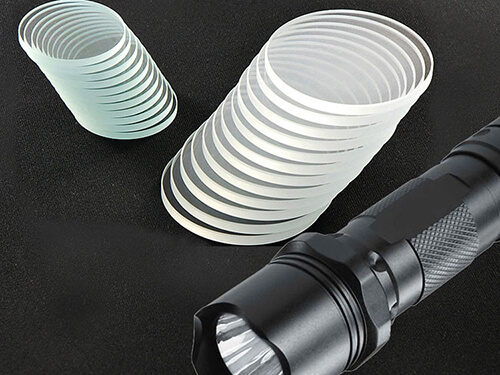Flashlights have become an indispensable tool in our daily lives, offering illumination in various situations.
One essential component that contributes to the performance of flashlights is the lens.
A flashlight lens plays a crucial role in focusing and directing the light beam efficiently.
When it comes to selecting the right lens material for flashlights, several factors must be considered, including optical properties, durability, and resistance to environmental conditions.
In this article, we will delve into the different glass materials suitable for flashlight lenses, highlighting their benefits and characteristics.
Borosilicate Glass:
Borosilicate glass is a popular choice for flashlight lenses due to its exceptional thermal resistance and high transparency.
This type of glass is known for its low coefficient of thermal expansion, making it resistant to thermal shocks.
Flashlights equipped with borosilicate glass lenses can withstand rapid temperature changes without cracking or breaking.
Furthermore, borosilicate glass offers excellent clarity and light transmission, ensuring optimal brightness and beam quality.
Sapphire Glass:
Sapphire glass, also known as synthetic sapphire or corundum, is a highly durable and scratch-resistant material often used in high-end flashlights.
Its exceptional hardness, second only to diamond, provides excellent protection against scratches, ensuring long-lasting lens clarity.
Sapphire glass is also renowned for its high light transmission capabilities, allowing flashlights to produce bright and focused beams.
Although sapphire glass is more expensive than other options, its superior durability and performance make it a valuable choice for professional-grade flashlights.
Toughened Glass:
Toughened glass, commonly referred to as tempered glass, is a type of safety glass that has undergone a specialized heat treatment process. This process strengthens the glass, making it more resistant to impacts and thermal stress.
Flashlights equipped with toughened glass lenses are better protected against accidental drops or impacts, reducing the risk of lens breakage.
Additionally, toughened glass maintains good optical properties, ensuring clear light transmission and minimizing distortion.
Mineral Glass:
Mineral glass, often used in the production of camera lenses and watches, is another suitable material for flashlight lenses. It offers excellent optical properties, including high light transmission and minimal distortion. Mineral glass is also known for its scratch-resistant properties, ensuring lens longevity even under demanding conditions. While not as impact-resistant as toughened glass, mineral glass provides a good balance between performance and affordability, making it a popular choice for many flashlight manufacturers.

Selecting the right glass material for flashlight lenses is crucial to ensure optimal performance and longevity.
Borosilicate glass provides excellent thermal resistance and transparency, while sapphire glass offers exceptional durability and scratch resistance.
Toughened glass enhances impact resistance, and mineral glass strikes a balance between performance and affordability.
Depending on your specific requirements, choosing the most suitable glass material will contribute to a brighter, more durable flashlight experience.
When selecting a flashlight, pay attention to the lens material, as it plays a significant role in determining the overall performance and durability of the device.
By understanding the characteristics of different glass materials, you can make an informed decision and choose a flashlight that meets your needs and preferences.